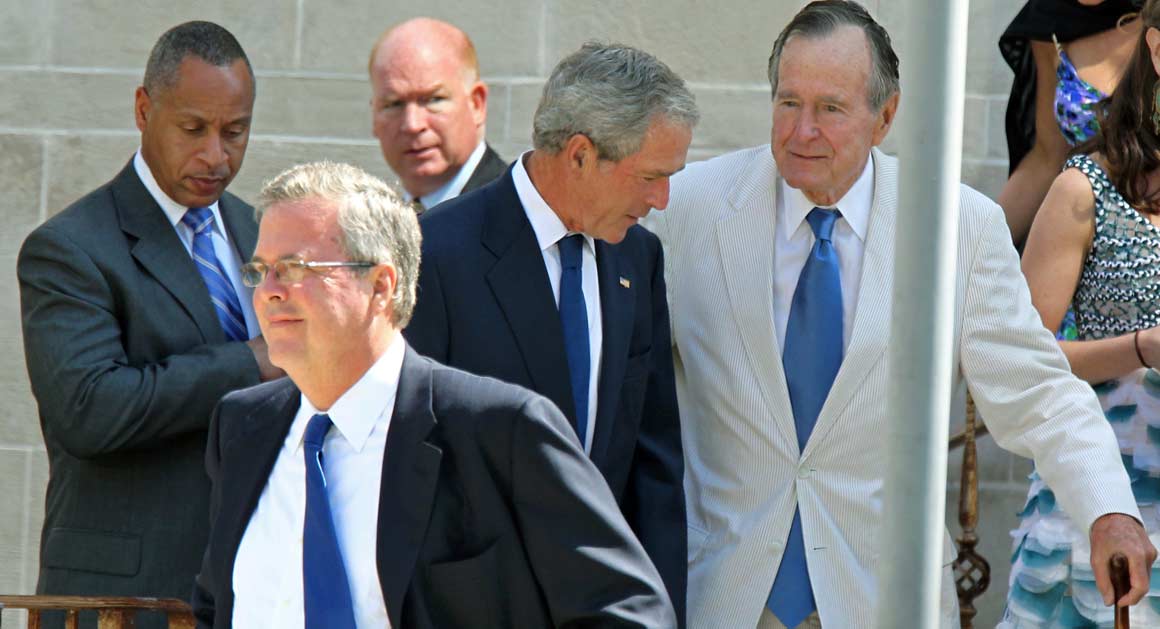
Despite his $120 million in cash and hyper-organized campaign, Jeb Bush out on the campaign trail looks like a man who’s not entirely sure he wants to be there, or what his message should be—which may help explain why this professional politician is still far to the rear of none other than Donald Trump, who’s running for office for the first time. And in that respect, perhaps, Bush, who didn’t seem to be having fun at the Iowa state fair last weekend and who sounded uncertain of himself at the Republican debate earlier this month, resembles no one more than another scion of a famous political family who ran for president 35 years ago and looked similarly conflicted, even bewildered, on the stump: Teddy Kennedy.
In 1980, well before he went on to become the lion of the Senate, Kennedy finally succumbed to years of public (and perhaps private) pressure to carry on the legacy of his two dead brothers and assume his rightful place in the White House. Kennedy boldly decided to take on a weak incumbent president, Jimmy Carter. But in one of the most famously incoherent moments in modern political history, when Roger Mudd of ABC News asked the usually golden-tongued senator the simple question, “Why do you want to be president?” Kennedy couldn’t answer in a way that made sense. It was the beginning of the end of his campaign. Ironically, Teddy didn’t regain his voice fully until he bowed out and the pressure was suddenly off. Then he delivered one of the greatest speeches of his life, ending in the “dream will never die.
It’s fair to ask whether Jeb Bush is running for comparable reasons—not necessarily because he’s got that unquenchable fire in the belly, but because, well, it’s just what Bushes are supposed to do. In The Kennedy Imprisonment, author Garry Wills made that argument about the Kennedy family: that they were prisoner of the family ethos. So too of the Bushes: they are expected to be part of the family business.
And within that business, the younger siblings often find themselves playing catch-up. The late Ted Kennedy was the baby of his well-known family, spending much of his life eclipsed by two older brothers, trying to live up to their legacy. Jeb, seven years younger than brother George W, tried to explain his motivation for his first (and unsuccessful) gubernatorial run: “I want to be able to look my father in the eye and say, ‘I continued the legacy.’” And yet as speculation about 2016 began to grow in recent years, even Jeb’s mother, Barbara, said at one point that he shouldn’t run, telling NBC in 2013: “We've had enough Bushes.
Thus, much as Teddy Kennedy often seemed to be running from his notorious past—Chappaquiddick among other things—as well as the differences between his reputation and that of his brothers, it often looks as if Jeb Bush can’t quite outpace that Bush legacy, especially his own older brother’s. W’s eight years as president were, to put it charitably, tumultuous. Arguably, two of Barack Obama’s signature accomplishments were cleaning up the messes his predecessor left him: the US war in Iraq and the collapse of the economy in 2008. When he left office, W’s job approval rating was down to 25 percent, according to Gallup. A poll of professional historians had 61 percent calling him “the worst in the nation’s history.”
It may be for these reasons that Jeb dithered so long before finally entering the race. And now, no matter where he goes or what he says, W’s political ghost often appears to be haunting him. In Iowa in recent days Jeb continued his attacks on Obama and Hillary Clinton over their Iraq policy, especially the decision to withdraw U.S. troops in 2011. But he was heckled over, of course, his brother. “Your brother signed the deal!” a heckler shouted.
It could have been modified, and that was the expectation,” Bush said. ““Everybody in Iraq and everybody in Washington knew that this deal could have been expanded. And now what we need to do–
“Your brother signed a bad deal!”
“–now we have to do something else,” Bush ended.
How do you live that down?
Ted Kennedy was 15 years younger than Jack, watching in wonder as his brother took the nation by storm, rising with extraordinary rapidity from member of Congress to Senator to President in 1960. Jack was a celebrity, bringing glitz, glamour and style to the White House. He was also immensely powerful, especially in his home state of Massachusetts, so much so that, merely for the asking, he was able to get Ted a job—as a US Senator.
When Jack was killed in Dallas, only three years into his first term, it was then brother Bobby’s chance for the limelight. Five years later, that chance ended when Bobby was shot in a Los Angeles ballroom, just after winning the California presidential primary.
That left it up to Ted.
People don’t like to speak ill of the dead, especially those who are cut down in their prime. Both Jack and Bobby had their flaws, of course, but in the aftermath of the assassinations, their reputations were almost incandescent, to many, even saint-like. Some saw their deaths as fundamental turning points in American history. What would America have been like had Jack and Bobby lived? No Vietnam? No Watergate?
That made for a heavy burden for Ted and it was in this context that he struggled and often failed. At times it was ugly. There was Chappaquiddick and the death of Mary Jo Kopechne, the boozing and escapades in Palm Beach, the broken marriage and the never-ending stories of infidelities and sexual philandering. (In one notorious 1989 incident, Ted was photographed having sex on a motorboat, prompting Alabama senator Howell Heflin’s gibe that he was pleased Kennedy had “changed his position on offshore drilling.”)
- Publish my comments...
- 0 Comments
